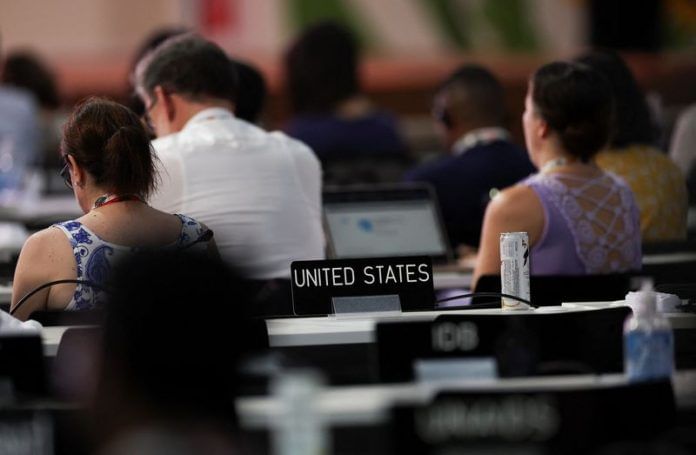By Lisandra Paraguassu, Kate Abnett and Sudarshan Varadhan
BELEM, Brazil (Reuters) -Pope Leo criticized world governments on Monday for failing so far to slow global warming and called for a stronger response to the threat, as countries at the U.N. climate summit in Brazil’s Amazon city of Belem entered the second week of negotiations with a goal to resolve their thorniest issues ahead of schedule.
The Pope’s message reflected mounting concern about flagging international ambition and rising greenhouse gas emissions a full decade after the 2015 Paris Agreement, a landmark deal at which countries for the first time agreed to limit global warming to well within 2 degrees Celsius above pre-industrial levels.
Scientists say the Earth is destined now to overshoot that threshold, opening the door to devastating impacts.
“The creation is crying out in floods, droughts, storms and relentless heat,” Pope Leo said in a video message played at an event on the sidelines of the summit.
“The Paris Agreement has driven real progress and remains our strongest tool for protecting people and the planet. But we must be honest: it is not the Agreement that is failing, we are failing in our response. What is failing is the political will of some.”
Delegates in the steamy riverside city are seeking to reach agreement by Wednesday on a number of difficult topics, including climate finance and goals to reduce emissions, with the rest of the agenda to be resolved by the last scheduled day on Friday, COP30 President Andre Correa do Lago said on Monday.
“It’s super difficult, as you all know, because it’s lots of documents, and there are still many texts that are open… but all involved thought that it’s worth the try,” he said.
Most climate summits spill into overtime.
DEVELOPING NATIONS FLEX MORE MUSCLE
Governments representing nearly 200 countries gathered in Belem for the annual conference to hash out a deal they hope can demonstrate global resolve to follow through on the goals of the Paris Agreement, while acknowledging its shortcomings by laying out clear plans for future climate action.
The job will not be easy. Countries are now digging into some of the toughest issues – from fossil fuel use to climate finance – many of which have been left off the formal agenda to ensure the talks keep moving even if one issue gets hung up.
“The time for performative diplomacy has now passed. Now is the time to roll up our sleeves, come together and get the job done,” U.N. climate chief Simon Stiell told delegations in a speech opening the second week of the conference.
Brazilian President Luiz Inácio Lula da Silva is expected to arrive on Wednesday to help rally consensus among parties at the summit ahead of Friday’s final scheduled session.
New dynamics in climate diplomacy have seen China, India and other developing nations flex more muscle this year, while the European Union is hobbled by weakening support back home and the once-dominant United States has skipped out altogether.
Danish climate minister Lars Aagaard said the European Union was showing leadership but that it was still early in the negotiations.
MIND THE GAPS
Over the last week negotiators had a chance to air their differences on three key issues: climate finance, unilateral trade measures, and planned emissions cuts that do not go nearly far enough.
“It is a must-have to be able to talk about how we close the gap going forward,” Norway’s climate minister, Andreas Bjelland Eriksen, told Reuters.
A bloc of developing countries is also seeking a payment schedule to ensure wealthy countries follow through on promises made at last year’s COP29 to annually deliver $300 billion in climate finance by 2035. The United States – absent from COP30 – has reneged on past commitments.
PROGRESS IN SOME, BUT NOT ALL, AREAS
Denmark, which produces the majority of its electricity from wind, announced a new binding target to slash its greenhouse gas emissions by at least 82% by 2035, compared with 1990 levels.
“We think this is the highest, most ambitious number of any country in the developed world,” Aagaard said.
Denmark’s target is substantially more ambitious than the EU’s overall commitment to a 66.25%-72.5% emissions cut by 2035.
South Korea, which operates the world’s seventh-largest fleet of coal-fired power stations, announced it would stop building new coal plants and phase out nearly two-thirds of existing ones by 2040. The rest would also be phased out, though the timeline was not specified.
However, the transition away from fossil fuels in developing countries remains a vexed issue.
Indonesia’s plan to retire 6.7 gigawatts of coal-fired power plant capacity by 2030 is at risk of failure due to stalled disbursal of funding from rich countries.
“If there is no one really willing to jump in to finance the coal phase-out, then we will have to think about whether phase-out is actually the best option,” Paul Butarbutar, head of the Indonesia Secretariat of the Just Energy Transition Partnership program, told Reuters.
(Reporting by Lisandra Paraguassu, Valerie Volcovici, Katy Daigle, Simon Jessop, William James, Kate Abnett and Sudarshan Varadhan; Additional reporting by Eduardo Baptista in Beijing; Editing by Richard Valdmanis, Conor Humphries and Nia Williams)
Disclaimer: This report is auto generated from the Reuters news service. ThePrint holds no responsibility for its content.






